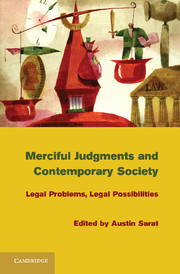Book contents
- Frontmatter
- Contents
- Acknowledgments
- Contributors
- When Can or Should Legal Judgment Be Merciful? An Introduction
- 1 The Place of Mercy in Legal Discourse
- Commentary on Chapter 1
- 2 Mercy, Crime Control, and Moral Credibility
- Commentary on Chapter 2
- 3 Defending a Role for Mercy in a Criminal Justice System
- Commentary on Chapter 3
- 4 Actions of Mercy
- Commentary on Chapter 4
- 5 A Feminist View of Mercy, Judgment, and the “Exception” in the Context of Transitional Justice
- Commentary on Chapter 5
- Index
- References
Commentary on Chapter 2
Thoughts on Mercy and Self-Examination
Published online by Cambridge University Press: 05 December 2011
- Frontmatter
- Contents
- Acknowledgments
- Contributors
- When Can or Should Legal Judgment Be Merciful? An Introduction
- 1 The Place of Mercy in Legal Discourse
- Commentary on Chapter 1
- 2 Mercy, Crime Control, and Moral Credibility
- Commentary on Chapter 2
- 3 Defending a Role for Mercy in a Criminal Justice System
- Commentary on Chapter 3
- 4 Actions of Mercy
- Commentary on Chapter 4
- 5 A Feminist View of Mercy, Judgment, and the “Exception” in the Context of Transitional Justice
- Commentary on Chapter 5
- Index
- References
Summary
As is the case with most writing on criminal law, Paul Robinson's thoughtful analysis of mercy focuses primarily on offenders, their offenses, and the consequences to society of various ways of dealing with the problem of crime. This response asks whether we might learn anything more about mercy if we expand the frame of inquiry to include consideration of ourselves (“ourselves” being those responsible for the institutions through which criminal justice is carried out) and our administration of criminal prosecution and punishment.
Crimes and Punishments
Robinson groups criminal justice systems into the familiar alternative categories of those whose primary concern is justice and those whose primary concern is utility. The utility-based systems are designed to achieve “effective crime control,” whether through deterrence, rehabilitation, or incapacitation. Justice-oriented systems all operate on the premise that the system's goal is to give offenders the punishment they deserve, although different systems may employ differing conceptions of desert. Robinson's chapter focuses on both deontological desert, whose aim is to “transcendthe particular people and situation at hand and embod[y] a set of principles derived from fundamental values, principles of right and good,” and empirical desert, which is “derived from the shared intuitions of justice of the community to be bound by the law.” Interestingly, Robinson endorses empirical desert primarily for utilitarian reasons. The community's intuitions of justice may be mistaken, but they are nevertheless useful tools for strengthening crime control: “[B]y building the moral credibility of the system, [empirical desert] can promote cooperation and acquiescence with it, harness the powerful social influences of stigmatization and condemnation, and increase criminal law's ability to shape societal and internalized norms.”
- Type
- Chapter
- Information
- Merciful Judgments and Contemporary SocietyLegal Problems, Legal Possibilities, pp. 124 - 137Publisher: Cambridge University PressPrint publication year: 2011



